PNCR remains unified, organised and dynamic
On Sunday 27th November, the People’s National Congress Reform (PNCR) held its Regional Party Conference for Region #3. This is the fourth Regional Party Conference in 2022. Others were held for the Georgetown District, Region #4, and Region #5. Conferences for the other regions will soon be held.

These conferences serve as evidence of the continued strengthening of the Party as an organization. They speak to its vibrant membership, its robust structure, its unshakeable unity, its deepening democracy, and its unwavering commitment to its goals.
In addition, the PNCR will be holding its fourth statutory General Council in January 2023. Let us also report that the Party’s Central Executive Committee (CEC) continues to meet regularly in statutory and extraordinary sessions. This year, the GYSM has held several symposia, workshops, and socials for young people. And the National Congress of Women (NCW) continues to be on the forefront of women’s rights in Guyana. Thus, on International Day for the Elimination of Violence against Women, the NCW launched its


16 Days of Activism campaign against GenderBased Violence.
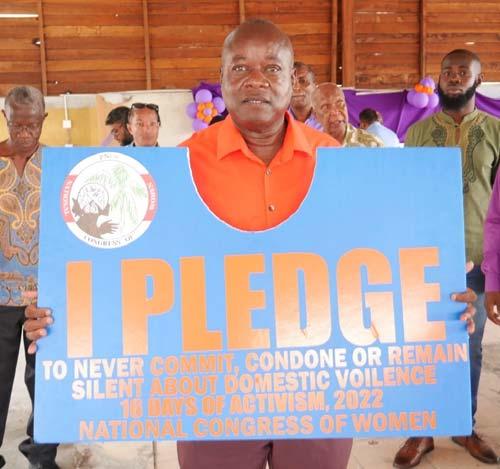

The PNCR Party therefore remains energetic and dynamic. We have travelled far beyond the last Congress in December 2021 and now function with all hands on deck. Unity and teamwork are high and growing—belying the mischievous fake news to the contrary.
As in any democratic and self-assured institution, we expect and entertain a variety of views and individual initiatives. But this is a Party formed by one of Guyana’s greatest intellectual minds, Linden Forbes Sampson Burnham. Robust debate is therefore in our Party’s DNA. For us, disagreements do not mean discord. For us, these serve to enrich and invigorate the Party. As the Party comes to end of the first year under its new leadership, it remains confident in its organization. We pledge our continued commitment to work on behalf of our members, supporters, and the wider Guyanese citizenry. Through our people-centered and people-first vision to national development, our next government will transform the lives of all Guyanese.

Vol. 66, No. 11 NOVEMBER 2022 newnation_gy@yahoo.com Price: $100
Page 11 8% salary increase will have no impact on cost of living woes
Page 6 & 7 Page 4
Page 10 Page 8
for public servants. Outreach exercises to communities.
World
Diabetes Day Message.
Discussion (Green) Paper: Coalition proposed Early Childhood Care and Education policy. Correcting misconceptions on our call for a clean voters list and Eday biometrics
The Regional Committee of Region #3 held their Regional Conference on Sunday 27th November at the Vreed-en-Hoop PNCR Office. The following persons who were elected are from left Rochelle Rimple-Smith - Chairperson; Perry Birbal - Vice Chairman; Hazelene ThorneSecretary; John Adams - CEC Representative and Alshazie Ramlakhan - Treasurer. The Committee Members elected are Harriram Samlall, Dolis Eadie and Eviton Gulliver. Congratulations!
Party Leader, Mr. Aubrey C. Norton, MP holds up the Pledge on the occasion of the International Day for the Elimination of Violence against Women which was observed on Friday 25th November 2022. The NCW launched its 16 Days of Activism campaign against Gender-Based violence which will be held in all the Regions of Guyana in observance of the occasion.
Page 2
Editorial: Towards UN Sustainable Development Goal #5: Gender Equality.
Analysis and Opinions
A short rebuttal to Ashni Singh on the shocking 2022 World Bank Report on poverty in Guyana
saw food prices rising by some 11.6% in 2021. By June 2022, the Bank of Guyana Half-Year Report informs us that food prices have increased by a further 8.1%. On the current trend, food prices by Christmas 2022 will likely be 25% higher than during last year's Christmas." This trend has continued, with the prospect of a bleak Christmas seeming more certain by the day.
Towards UNSustainable Development Goal #5: Gender Equality
On 25th November, the world observed this year's International Day for the Elimination of Violence against Women. The annual observance calls on people everywhere to take action to end violence against women and girls in communities, at home, in public spaces, in schools and workplaces, during conflict and in times of peace.
Ending violence against women is one of the targets in the UN Sustainable Development Goal (SDG) #5 (Gender Equality). Two of the other main targets in SDG #5 include ending all forms of discrimination against all women and girls everywhere; and fostering equal rights to economic resources.
In this month's Editorial, we revisit a practical proposal we made to address gender discrimination in the workplace.
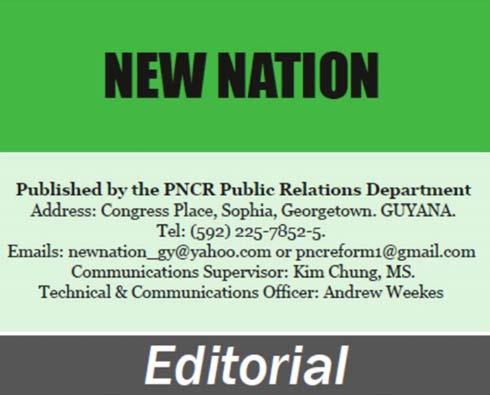
In October last year, the Guyana Water Inc (GWI) was accused that its all-male Corporate Management Team reflected blatant gender bias in its employment practices. Joining the fray, the Women and Gender Equality Commission (WGEC), our constitution body set up to promote women rights, called on the subject ministers to immediately correct what it described as an appalling anomaly. GWI, for its part, denied any such bias, claiming that it is "an equal opportunity employer and practices no exclusionary rule or policy during its hiring process." The matter soon faded from public view.
The incident, however, exposed severe limitations in efforts to wipe out gender discrimination and to achieve gender equality in Guyana's workplaces in the public and private sectors. What are these limitations? First, staff in our workplaces are not trained to consciously perform their duties free of bias, whether based on gender, race and ethnicity, religion, political affiliation or otherwise. Second, the country's laws on equality of opportunity and elimination of discrimination are inadequate. Those that exist are yet to be integrated into workplace policies, processes, practices, and organizational culture. Third, the WGEC, as the purpose-built constitutional body on gender rights, has failed thus far to live up to its mandate.
What are the ways to overcome these and other limitations? The solution lies in adopting the Equality Duty model of the UK Equality and Human Rights Commission.
An Equality Duty is an obligation placed on public bodies to proactively embed equality in their routine operations. Routine operations include staffing (such as hiring, compensation, and promotion) and those outwardlooking (their service delivery and their procurement practices). To ensure that public bodies meet this duty, the UK rights commission offers guidance, but is also legally empowered to set rules, exercise oversight, and impose penalties. In practice, such a system works by ensuring public entities (i) take direct responsibility for integrating best practices on equality into their operations, (ii) collaborate with the rights commission on crafting pro-equality measures specific to their organization, and (iii) are regularly monitored and guided by the commission.
This approach transforms attitudes and actions within workplaces from reactive to proactive, from cosmetic to systemic, from one-time to all-time, and from merely prevention of negatives to promotion of positives.
In the GWI matter, therefore, had the WGEC adopted such a systematic approach, then acts of willful or unwilful gender discrimination would have been prevented, or detected and fixed. In addition, allegations of gender bias would be investigated based on a rules-based compliance system.
New Nation recommends this proposal to convert the talk about gender equality into concrete and impactful action.
I noted the comments on Thursday 3rd November made by the Senior Minister with Responsibility for Finance Ashni Singh regarding the alarming poverty statistics on Guyana that the World Bank released just last month October. The PPP continues to peddle the lie that everything is the Coalition's fault, that the PPP remains blameless for all the country's ills, and that nothing can be done to improve people's lives now. We will not allow them to distract the nation from the fact that Guyana received hundreds of millions of US of unexpected revenue from the high oil price and the government has refused to use these funds to address the cost-of-living crisis and lessen the burden on the struggling citizenry.
The APNU+AFC press release in September pointed out that: "When one examines food alone, Guyana
Even more astonishingly, Minister Ashni Singh appears to be looking to minimize the World Bank's $5.50 a day poverty measure, as if it is insignificant, when we all know living on $5.50 a day is a desperate situation. In addition, for huge numbers of Guyanese to be living on $5.50 a day, when the country is earning billions of USD in oil revenue, is both preposterous and a national disgrace. It is a direct indication of PPP incompetence and corruption.
I reiterate the position of the APNU+AFC that the $US hundreds of millions of unexpected revenue should be fairly distributed to households across Guyana, safe in the knowledge that at least $300,000 per household is available. This money can even be distributed over time to mitigate any inflationary effects. Everyone knows the government's coffers are full. The government is making a deliberate choice not to help the average Guyanese.

Oil and Gas Conference will be no different than its predecessor
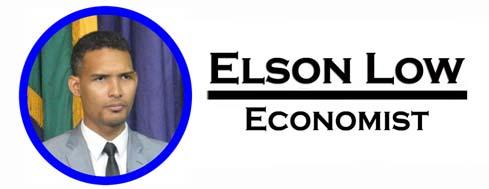
I have read with interest that the PPP/C Government will be hosting its second Oil and Gas Conference in February 2023. However, I wish to remind Guyanese of the advice given by distinguished speakers at their first Conference in February 2022. Presentations made by renowned world leaders from Suriname, Barbados, and Ghana, to name a few, admonished the Government of Guyana on how this sector should be managed.
Prime Minister Mia Mottley was very clear that Guyanese ought not to be treated as “tenants” in their own country. President Nana Addo Dankwa Akufo-Addo of Ghana during his presentation said, “to ensure energy sustainability, it is critical that we balance carefully social, economic and environmental benefits in a continuously changing world”. Further in his address he went on to say that “no energy project therefore, no matter how high its return in value, is worth it if the interests of some or majority of the stakeholders are not properly represented, and they are left impoverished and dissatisfied.”
If one is to reflect on the concerns and advice of
these presenters, it would be realized that nothing significant has been done to-date by the PPP/C regime to ensure that Guyanese become the greatest beneficiary from our country’s oil and gas wealth. There are many questions the PPP/C regime must provide answers for. It is approximately ten (10) months since the first Conference in February 2022, what is there for Guyanese to celebrate? Where is the transparency and accountability of the resources from this sector? The amendment to the 2019 Natural Resource Fund Act is heavily flawed and Guyanese are yet to know what the plans of the partisan downsized committee are regarding national development projects and expenditure as a whole. What Guyanese have witnessed, over the last year, is the total mismanagement of the oil resources, discrimination and victimization faced by some ethnic groups and vulnerable segments of the society, in the distribution of “cash grants” and “awarding of contracts.” There is no evidence of investments, budgeted or otherwise, for the health and education sectors which would benefit ALL of Guyana, in particular our pensioners and school children. Editor, for the edification of your readers, the PPP/C regime is forging onward to host another conference where millions will be expended.
Unfortunately, the February 2023 Conference, will be no different, rather it will be another event full of presentations by well-intentioned eminent guest speakers, propaganda and empty promises by the PPP/C Government and its partisan collaborators!
The people are not interested in Teixeira’s propaganda
Gail Texeira's letter published in the Stabroek News of 2nd November 2022, titled, “Guyana is rapidly moving forward and including all people regardless of race, class, geography' could well earn the first prize for literature in the fiction writing department.”
It is unnecessary to respond in detail except to note or boast first, that we are the fastest growing economy in this part of the world. Be that as it may, as a purported Socialist Ms. Teixeira should know that what is relevant and important is how much ordinary people and, in particular, those assumed to be non-supporters of the PPP are benefiting. Teixeira conveniently ignored a recent report from the World Bank which states as follows: - "That Guyana's poverty rate is among the highest in the Latin America and Caribbean (LAC) region."
The MP and Minister of Parliamentary Affairs and Governance has carefully ignored a plea to her Government to immediately double the salary and wages of Public Servants earning less than one hundred and twenty thousand ($120,000) dollars per month.
The people who are now cutting corners to find the money to pay the fees for the upcoming CXC Examinations and must pay more for all of the basic food items are not interested in propaganda nor the pennies and crumbs from the master's table, but a living wage so that they can live with some level of dignity. They say, 'you can fool some of the people some at a time, but not all the people, all the time'.
PAGE 2 NEW NATION NOVEMBER 2022
Hamilton Green, OR Elder & Former Mayor
The PPP regime approach is responsible for flooding and destruction in the city

Opposition is utilising the tools at its disposal
Responsibility for the flooding of Georgetown must be placed squarely at the feet of President Irfaan Ali and the PPP. The government’s incompetence, starving of the city of resources, seeking to control all development in Georgetown and bypassing the elected council are responsible for the high level of flooding we are experiencing in the City.
What makes the PPP’s policy terrible is that the floods cost the people a lot in damages. It is worse when it is noted that people who are finding it difficult with the high cost of living have to spend their scarce resources to repair damages and replace damaged equipment, inter alia. Many businesses are suffering because of the PPP’s ill-informed policies and programmes.
It must be recalled that the Coalition government implemented a plan to ensure Guyana, including Georgetown is well-drained and cleaned thus significantly reducing flooding in the City. Flooding is back thanks to PPP incompetence, negligence and its desire to punish a Council elected by the people. The PPP in its quest to dominate and control the City Council is pursuing a policy of starving the Council of resources and allowing garbage to build up and drains to clog.
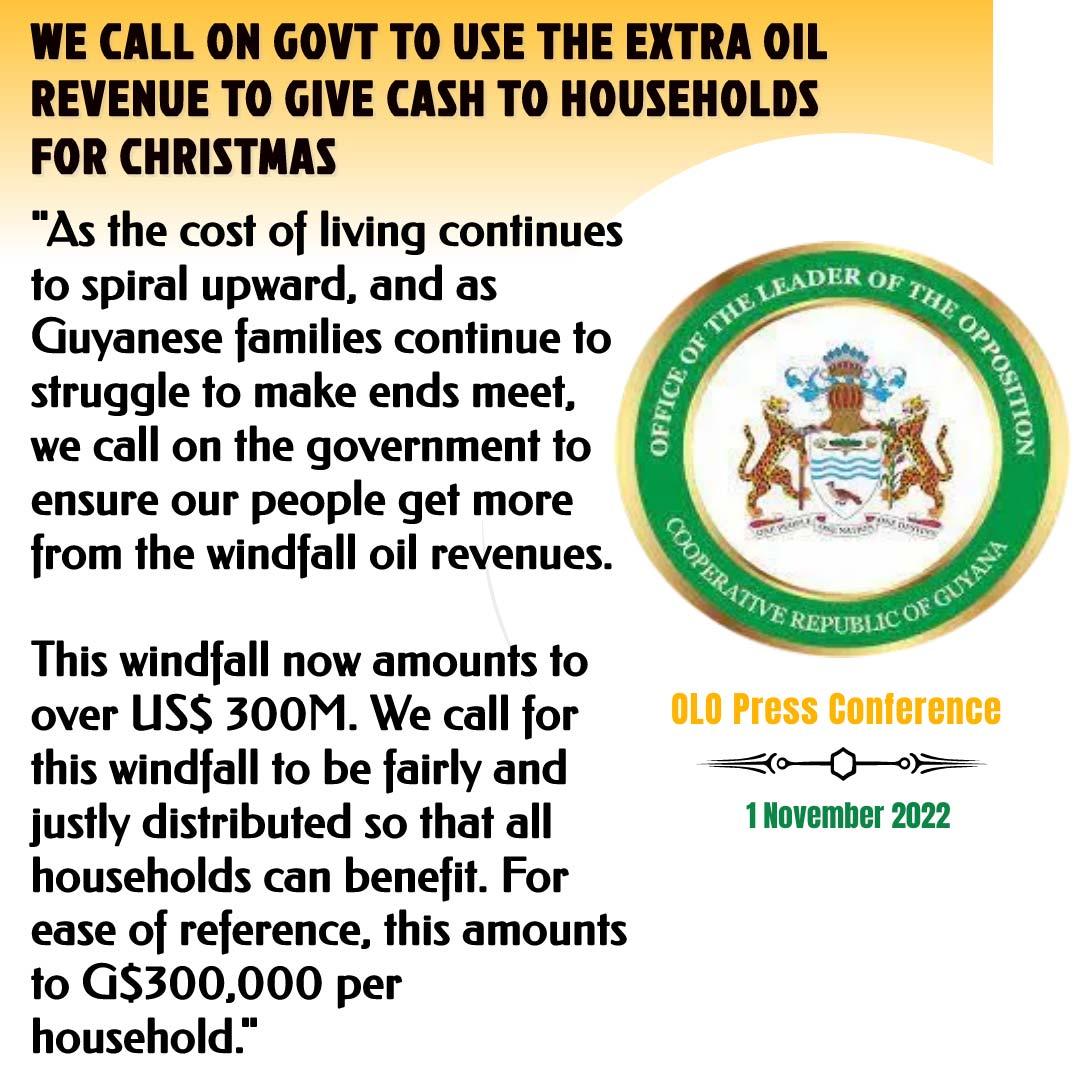
It is unbelievable that the PPP will use such spiteful and vindictive approaches
to be able to gain control of Georgetown. It is not the first time the PPP is using this anti-people approach to achieve narrow political objectives. This approach was used and failed before and must be condemned and rejected by all right thinking Guyanese.
It must be noted the PPP involves itself in so-called clean up exercises that put money in the hands of their cronies while not resulting in a clean and welldrained city.
The PPP has a track record of creating the problems and then award contracts under the guise of emergency work by way of sole sourcing to their elite, friends, families and favourites. Their philosophy is to make their cronies rich at the expense of our people, especially the poor and vulnerable.
The focus must be on improving the quality of life of the people in Georgetown and not on promoting PPP corruption and public relations stunts under the guise of clean up campaigns. All Guyanese must join in condemning the Ali regime for utilizing such an outdated and barbaric approach to the Capital City and must reject the PPP at the polls. In a democratic society the State is obligated to allocate resources to the elected City Council so that they can serve the people of Georgetown. Unfortunately, the PPP talks about democracy but acts in a dictatorial way.
In its Sunday editorial, Stabroek News alleges, yet again, that the Opposition is “weak and ineffectual” in resisting the PPP’s politics of exclusion and domination. In considering this allegation, bear in mind that the very Stabroek News would be among the first to criticize the Opposition of “excesses” should it resort to hard extra-parliamentary action. We must therefore conclude that Stabroek News imagines that there exists a zone between these “excesses” and the “weak and ineffectual” actions where the Opposition can effectively rope in the PPP.

Where to locate this zone? A possible search algorithm is one where we first identify the political tools at the disposal of the opposition in Guyana, followed by assessing the potential effectiveness of these tools, followed by comparing that assessment to how the Opposition has actually performed.
The first tool is parliament. In assessing its potential, we must note that Guyana’s political system is both majoritarian and winner-takes-all. The party in power therefore has almost total executive authority in addition to the ability to change the rules of the game and to pass all laws with a oneseat advantage. On the flip side, the Opposition can block no government measure through a supermajority requirement or a US-style filibuster. Nor can the Opposition exercise effective oversight once the PPP-chaired parliamentary committees do not or hardly convene; nor if its motions can be easily outvoted or, worse, not even entertained by a lackey Speaker of the House.
Even within this tight space, the Opposition has tabled numerous motions and questions, used the forum to publicly air its positions in debates, repeatedly called on the Speaker to man up, used the boycott card, and publicly outlined its vision for an effective parliament. True, the four parliamentary sectoral committees hold promise as investigative and oversight bodies, and the Opposition should vigorously pursue this promise when the chairmanship rotates over to it.
The second tool involves legal action. The Opposition has filed a range of actions—some successfully, some not, some pending, and more likely to be filed. On this front, the Coalition cannot be rightly accused of being weak. What about the court of public opinion as the third tool? Here, public education and awareness is key. The Opposition holds regular press confer-
ences, issues frequent press releases, manages several active Facebook pages, runs several popular podcasts, conducts community outreaches, and holds public meetings. This is a tool with much scope, and the Coalition has not been idle.
As a fifth tool, we must mention the lobbying efforts of the Opposition. The Opposition continues to meet local stakeholders and the diplomatic community—and is active on the US political circuit. It is not by chance that the US government has recently been repeatedly calling for clean government, inclusion, and shared prosperity in Guyana. Nor is it by chance that individual US politicians have been highlighting racial and political discrimination in Guyana.

We come to the tool of extra-parliamentary action. Many supporters have criticized the Opposition Leader for under-using this form of political pressure. The call specifically is for more militancy in the streets. As I see it, this form of political action, to be effective, requires a critical mass of persons, and a particular frequency and intensity of action. Most importantly, once unleashed, the demands cannot be limited to low-level or stand-alone items but for large structural or systemic changes. The call for militancy, however, is a clear indication that many feel that the other tools are inherently ineffective, despite the Opposition’s best efforts. Does Stabroek News share this view?
At the end of the day, it will all be determined by national elections. The Opposition must show that it is a better option where improving the quality of lives of Guyanese is concerned. We should note that, while the Opposition embraces infrastructure and other such hardware development, it speaks of a people-centred and people-first vision. It speaks about ending poverty and expanding the middle class. It speaks about a womb-to-tomb social protection system.
Last week, on World Children's Day, it unveiled a policy brief on Early Childhood Care and Education, with the stated goals of ensuring a sound head start in life for all children, and of empowering women with greater opportunities and choices. All these ideas stand in stark contrast to the PPP’s sporadic, unpredictable, uninspiring, and corrupt approach to development.
Yes, the Opposition must continue to work hard. Eventually, the people will decide.
NEW NATION NOVEMBER 2022Page 3 POLITICAL
A vehicle drops into a hole in the road during flooding in the city on Tuesday 22nd November 2022.
DISCUSSION (GREEN) PAPER
Coalition’s proposed Early Childhood Care and Education policy
A) NEED ANALYSIS. Guyana ranks poorly on several critical measures of infant/childhood and maternal health and well-being. These include maternal mortality, low birthweight, preterm births, under-five mortality, child poverty, under-five malnutrition and stunting, and female mental health.
Guyana also ranks below par in female participation in the workforce, paid maternity or parental leave, formalization of care-giver services, and parentfriendly workplaces.
These inadequacies are directly felt by infants and young children, pregnant mothers, mothers with babies and/or young children, and families.
Few signs exist of improvement or urgent and serious government action.
B) POLICY RESPONSE. A comprehensive national policy is required — one that recognizes that:
(i) the early years are critical for every child’s development, as this is the period when the brain mostly forms. It therefore sets the foundation for lifetime optimal outcomes in education and cognitive ability; in mental, emotional, and physical health; and in life-long economic and social achievement. Therefore, the State must be involved to ensure young children get a right head start in life;

(ii) for children to thrive, parents and families must be supported;
(iii) pregnant women and mothers with young children face structural and cultural barriers to full participation and advancement in the workforce; in pursuing their education and careers; in becoming business owners; in achieving equality of opportunity; and in living a full and happy life;
(iv) investment in early childhood care and education is, first and foremost, a moral responsibility and constitutional obligation of government to its people. Importantly, it is also an investment in the social and economic development of the country.
Our next Coalition government will transform Guyana into one of the best countries to be a parent and to raise a family. To realize this grand vision, we will use our oil wealth to make huge public investments in four plans of action.
C) PLANS OF ACTION. Plans will be designed for:
1. providing top-quality health care and wellbeing support for mothers and children throughout pregnancy (pre-natal) and in the early years of the child (postnatal);
2. upgrading the current paid13-week maternity leave into a Paid Parental Leave Scheme that is longer, more generous, and allows both parents to participate.
3. implementing comprehensive free and high-quality early childhood education and care services for families on demand;
4. promoting flexible working conditions and supportive workplaces. Some brief notes on each of these actions:
FIRST. providing top-quality health care and wellbeing support for mothers and children throughout pregnancy and the early years of the child. Presently, health facilities across the country provide a fair measure of services.
We intend to ratchet up these services in terms of resources, coverage, quality, and effectiveness. To guide our efforts at
optimizing this aspect of our policy, we will first conduct a needs assessment survey.
SECOND. Upgrading the current paid 13-week maternity leave into a Paid Parental Leave Scheme that is longer, more generous, and allows both parents to participate. Our 13-week paid Maternity Leave is inadequate on several measures. It is too short. In this regard, it prevents too many mothers from breast-feeding for the medicallyrecommended six months. Moreover, the current leave scheme is contributory (deductions are made from paychecks). And it excludes fathers. We will bring Guyana in line with many of the advanced countries in granting 612 months of paid parental leave, arranged to include a role for the father.
THIRD. Implementing comprehensive free and high-quality early childhood care and education (ECCE) for all families. A comprehensive ECCE system serves the purpose of allowing mothers to easily transition back to work after leave. But, crucially, it also allows the State to continue to play its legitimate role in ensuring that young children, the future adults of the nation, are given a good head start in life.
This is the stage where the Day Care system becomes the centerpiece. In operational terms, our plan will ensure that (a) adequate and properly-regulated day care facilities will be available to fulfil demand—through a mix of stateowned facilities, private licensed providers, and home-based kinship or nanny care; (b) the State stands most or all of the cost for ECCE services, and (c) caregivers are adequately trained and compensated.
FOURTH. Flexible and supportive
workplaces. In this plan, we will either mandate or encourage/ incentivize both private and public sector workplaces to accommodate pregnant mothers and those with young children by enhancing workplace flexibility for both parents.
Measures would include allowing for part-time or unconventional work hours; leveraging technology (such as working from home); and reducing travel time to work and other undue burdens on mothers/parents.
But to go further. Our ECCE policy will cater for families in exceptional circumstances, such as:
(i) those with children with special needs.
(ii) those with self-employed and/or home-employed parents (parents not formally employed).
(iii) those simultaneously caring for children and their own parents.
(iv) those from migrant and refugee backgrounds.
(v) adoptive parents, foster parents or families with other relatives as main caregivers.
D) BENEFITS. What are the benefits to the Guyanese people of such a comprehensive approach? These include:
(i) Stronger and happier mothers and families, and a more caring and stable society.
(ii) Greater social justice through gender parity or equity.
(iii) Better socially-adjusted children— who are less likely to engage in deviant and criminal behaviors as they age. (iv) Expansion in GDP through greater female participation in the workforce and higher productivity from female workers.
Can we do it? Yes, we can.
PAGE 4 NEW NATION NOVEMBER 2022
EARLY CHILDHOOD CARE & EDUCATION
FEATURE
Annual Conference of Region #5
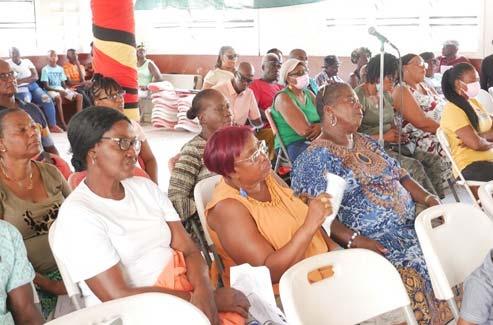
We can no longer continue the pattern of being outraged for a few days after these heinous acts occur and then settle back down to business as usual, leaving families alone to navigate their trauma and grief.
We are living in extraordinary times and stemming this tide of violence will call for extraordinary effort.
This is a national crisis. The time is now for an 'all hands-on deck' approach to dealing with this issue of intimate partner, family, and genderbased violence.
This is beyond politics. This is about us as Guyanese coming to the table, earnestly and honestly to craft meaningful interventions and solutions.
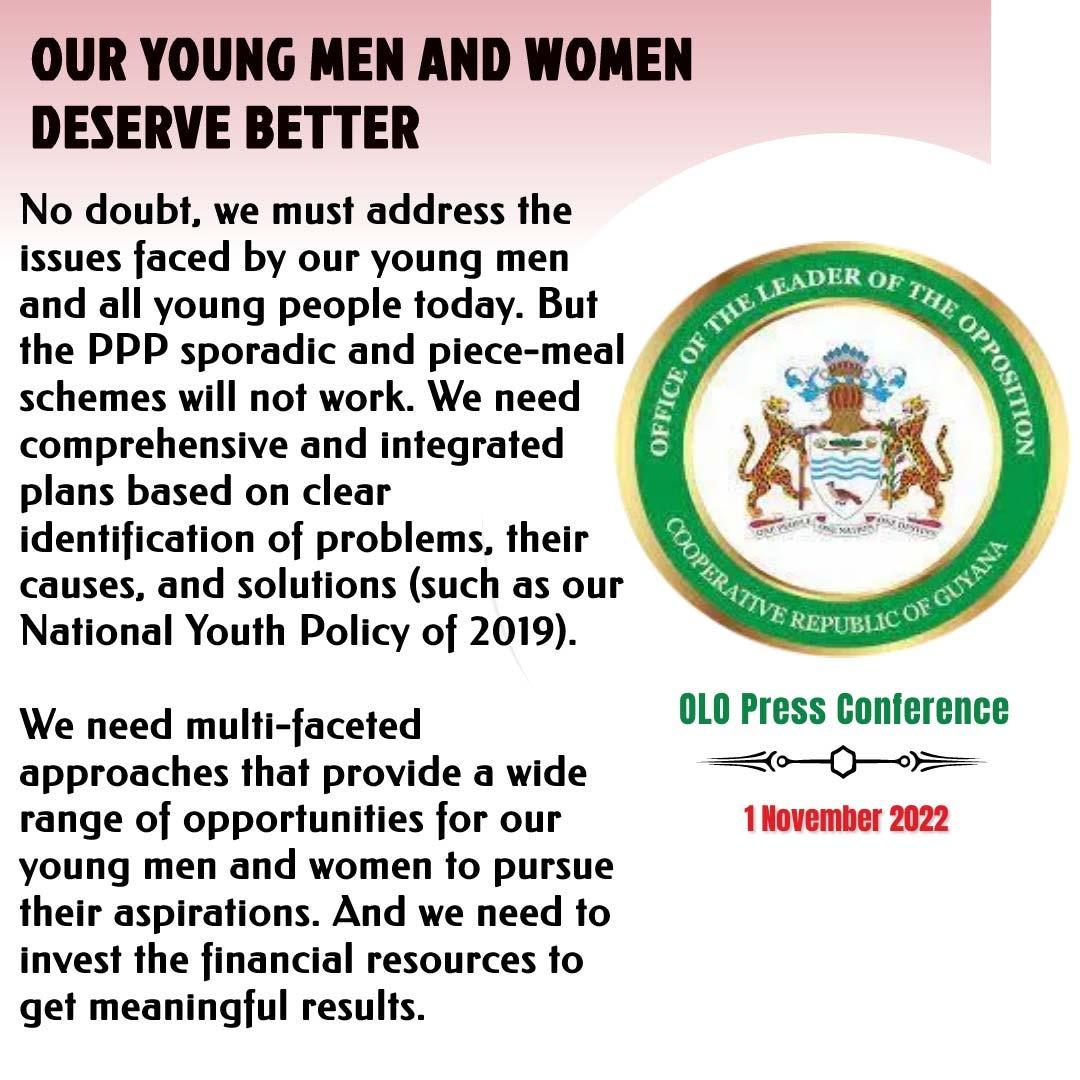


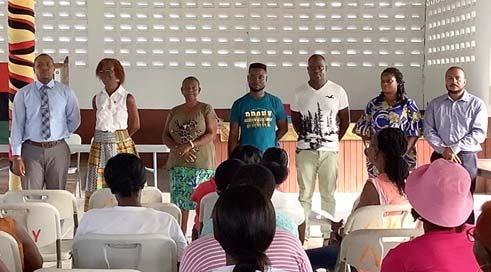
In the National Assembly, we must

craft bipartisan, progressive legislation to promote a comprehensive response to this issue. The Minister of Human Services has announced that the dated Domestic Violence Act will be overhauled in the near future and this is a useful start.

But this by itself will not be enough. The nature of the problem will require a whole of government approach which includes not only access to justice and accountability but also a complete overhaul of the systems currently in place and an urgent cultural paradigm shift within our homes and communities. This is no longer a “man and woman” problem. It is a national problem that requires all of us to solve.
Let's end this violence together!
NEW NATION NOVEMBER 2022 Page 5
Guyana! This scourge of women being murdered by their partners must STOP - Amanza Walton Desir, MP
Congratulations to the newly elected Executives of Region #5 Committee of the Party. The Party’s Regional Committee of Region #5 held their Annual Regional Conference on Sunday 6th November at the Paradise Community Center Groud, West Coast Berbice which saw several persons contesting for the various positions on the Committee. Below are the persons who won some of those postions. They are from left Chairman Vinceroy Jordan, MP, Secretary Carol Smith-Joseph, Treasurer Vidia Ragbeer, Committee Members Roston Lindo, Kelvin Chichester, Desney Mentore and CECMember Christopher Wordsworth. Absent was Vice Chairperson Angela McDonald.
A section of the gathering at the Regional Conference, Region No. 5.
Congratulations to our Member of Parliament, Mr. Dinesh Jaiprashad (left) and CEC Member Mr. Riaz Rupnarain (right), who have both graduated with their Masters in Education. Continue to excel in your achievements.
The continued discrimination in pro-coalition communitiesthe case of Sandvoort
On Thursday November 24th, 2022 Leader of the Opposition and the People's National Congress Reform, Mr. Aubrey C. Norton, M.P. and a team conducted an outreach in Sandvoort. While the Irfaan Ali-led administration is purporting to build 'ONE GUYANA', it continues to neglect and discriminate against communities that support the Coalition. Sandvoort, West Canje, Berbice, is one such community. During our outreach to this community, residents brought to our attention the discrimination being perpetrated by the PPP-led NDC and a PPP activist
who works with the region and the government.
Drainage and irrigation works, which are desperately needed in Sandvoort, are being ignored by the NDC, while equipment is provided to nearby communities in perceived PPP strongholds. We were informed that the machinery spent eight (8) months in Sandvoort without doing any work, but was sent to other communities in PPP areas to do the very D&I works.
Residents complained that for them to be given jobs and to receive cash grants, cattle and other livestock from the gov-
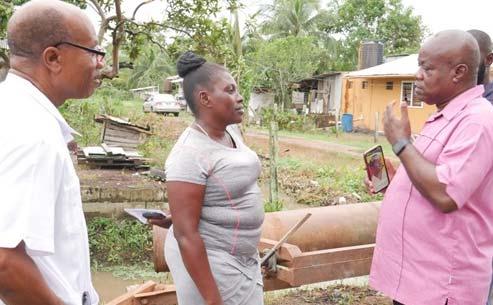
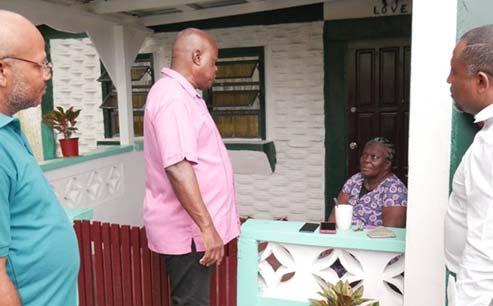
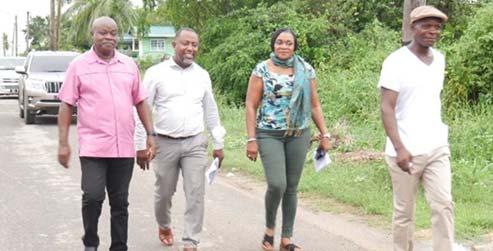
ernment, they are being told they must first join the PPP party. Further, staff nurses within the community have stated that they have not been paid for two (2) years.
The treatment of Sandvoort residents is clear ethnic and political discrimination, and an abuse of power by regional and local officials. Clearly, the PPP is using government funds and resources to achieve partisan political ends. These violations reveal bad governance at its worst. They are abuses of the human rights and the legitimate expectations of citizens. These acts of the PPP
(nationally, regionally, and locally) continue to fly in the face of the persistent calls by the Opposition parties, civil society, the wider Guyanese society, and the US government for inclusive and shared economic growth and development.
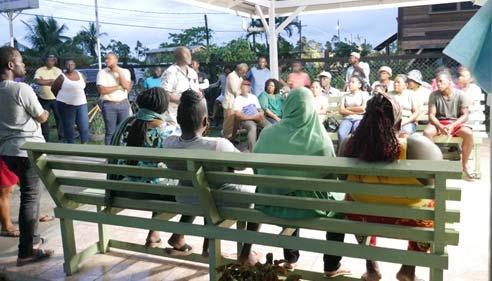

We join with the good people of Sandvoort in calling on the PPP regime to immediately address their needs, stop the discrimination against their community, and ensure the fair allocation of government resources which belong to the people of Guyana, including the people of Sandvoort.
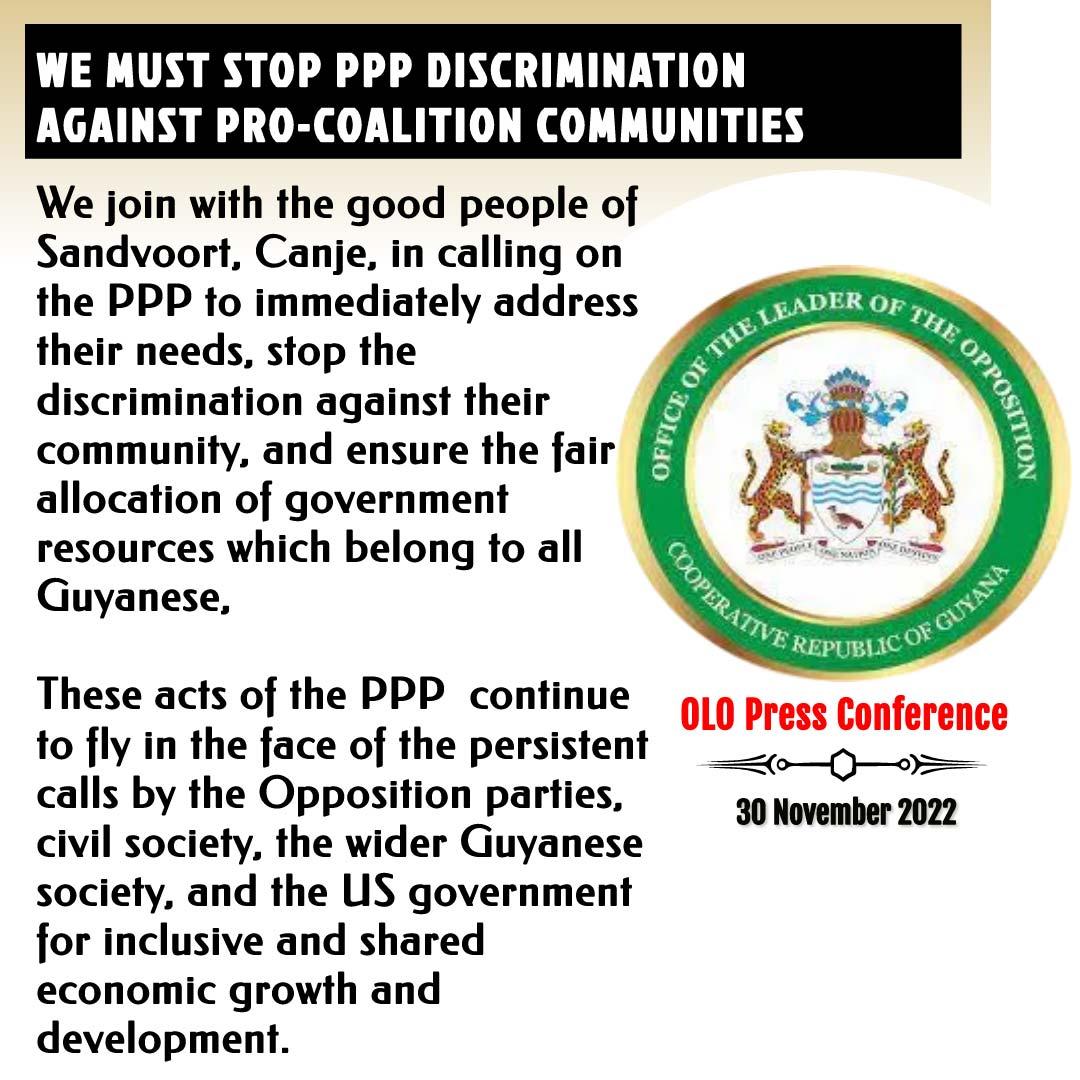
PAGE 6 NEW NATION NOVEMBER 2022
OUTREACH
Party Leader, Aubrey C. Norton, MP and Team walks through the community of Sandvoort, West Canje Berbice on Thursday 24th November 2022.
Party Leader, Aubrey C. Norton, MP, interacts with residents of Sandvoort on issues of concern to them during an outreach to the community on Thursday 24th November 2022.
A section of the gathering at a meeting held by Party Leader, Mr. Aubrey C. Norton, MP, at Sandvoort during an outreach to the community on Thursday 24th November 2022.
OUTREACH
Opposition Leader conducts outreach in Kuru Kururu
Leader of the Opposition and Leader of the PNCR, Mr. Aubrey C. Norton, MP, on Saturday 19th November, conducted a community outreach in Kuru Kururu, the largest settlement on the Soesdyke/Linden Highway.
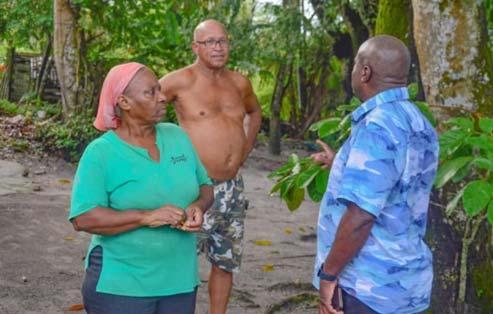
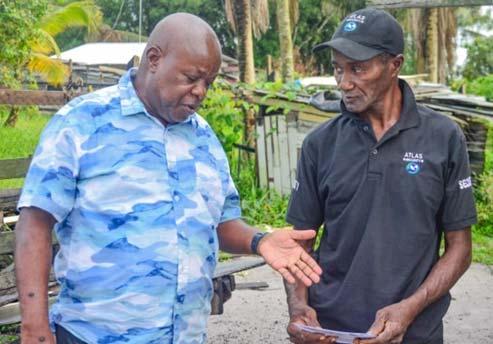

During the visit several residents expressed their dissatisfaction with the poor state of internal roads and drains, while many also claimed that state resources coming to the community are
unfairly distributed; several residents said that until now they have never received their COVID-19 cash grant as their homes were simply ignored by agents conducting the distribution.
The Opposition Leader reassured the community that he will continue to represent their interest as he again called for the government to be transparent and fair in the use of state resources.
The decision of the Chief Justice in August 2019 on the constitutionality of removing the names of non-resident citizens from the existing National Register of Registrants (NRR) must be understood as a pure legal matter. The Chief Justice decided the case based on the laws of the country as they are currently written. She found that, although our statutes (such as the National Registration Act) specify residency as a requirement for registration, the Guyana constitution, the country’s supreme law, did not provide the necessary cover. As such, all pre-existing clauses in our secondary legislation that mandate a residency test have been nullified.
The unintended consequences of the Chief Justice’s pure legal ruling, however, jeopardize Guyana’s democracy and political stability. The immediate jeopardy is the increasing bloating of the NRR and the List of Electors to the point where the number of names on both lists will soon surpass the total national population. This is unacceptable. We have repeatedly stated that elections using a bloated list would always be untrustworthy and contentious; as such a list could be and has been used in election fraud.
The nullification of the residency requirement, however, poses another danger. A case could now be made that all adult Guyanese citizens have a right to register and to vote regardless of where they live in the world. Even more, a court could accept the argument that GECOM must do all in its power to ensure these non-resident citizens can
exercise this right without undue burden, such as finding the time and money to travel to and from Guyana.
In a nutshell, we are looking at the possible re-introduction of overseas or external voting. For a variety of reasons (democratic, financial, administrative, political, and historic) Guyana must urgently shut the door on this possibility. To this end, parliament must now take up its role and responsibility.
Parliament must urgently address the unintended consequences of the Chief Justice’s straight legal ruling. Parliament must seek to prevent the political dangers the absence of a residency test will provoke. Parliament must ensure that elections in Guyana are accurate, credible, and can win the public trust.
Since around 1985, the residency requirement has reflected the will of the people of Guyana. It has birthed several clauses in the National Registration Act and has guided several rounds of fresh registration. A national consensus has even emerged on the need to have periodical house-to-house registration to ensure a credible voters list. This national consensus resulted in GECOM’s decision to produce a fresh National Register of Registrants (NRR) every seven years to ensure a clean voters list. This commitment should be honoured.
Therefore, the failure of the PPP to join with the Opposition to amend the law to restore the residency test is A BETRAYAL OF THE PEOPLE OF GUYANA. The PPP has refused to respect the will of the people for its own narrow political ends.
PPP does not believe in local democracy
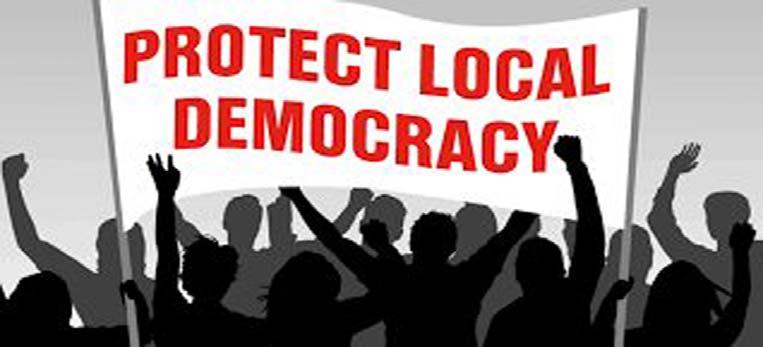
While the APNU+AFC welcome assistance to communities, we cannot accept, and must condemn Minister Deodat Indar disrespect for the people of Den Amstel.
When the government decides that it can take a Party hack who has no skill or experience in construction and give him a contract to do work on the community’s ground without consulting either the NDC or the management committee of the ground, then the PPP is contribut-

ing to lawlessness and disrespect to the Neighborhood Democratic Council (NDC) and the people of Den Amstel. There is little wonder therefore that the President himself described Minister Indar as “a waste Minister.”
The people of Den Amstel have a right to stand up to such lawlessness and to reject this pattern of discrimination as is also manifest in the PPP handling of land issues in Mocha and other communities.
NEW NATION NOVEMBER 2022 Page 7
PHOTOS || Party Leader, Mr. Aubrey C. Norton, MP, interacts with residents of Kuru Kururu on the Linden/Soesdyke Highway on Saturday 19th November during an outreach to that community.
The absence of a residency test puts Guyana’s democracy and political stability in grave danger
SOCIETY
NCW16 Days of Activism

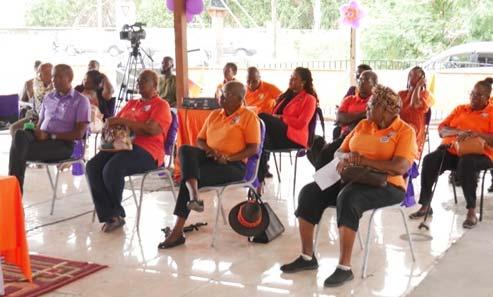
On Friday 25th November 2022, the National Congress of Women (NCW) launched its 16 Days of Activism campaign against GenderBased Violence at its headquarters at Public Road, Kitty. This event was held in observance of the International Day for the Elimination of Violence against Women and will conclude on the commemoration of the International Day of Human Rights on the 10th December. The 16 Days of Activism will be held in all the Administrative Regions of Guyana.
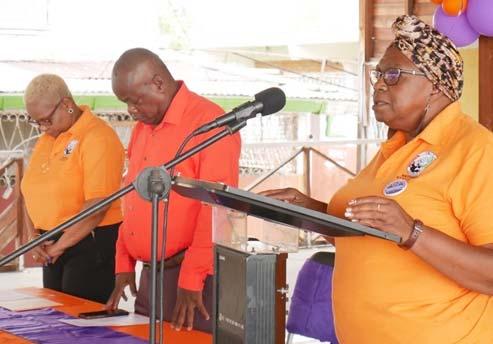
Correcting misconceptions on our call for a clean voters list and E-Day biometrics
On Tuesday 29th November, the Opposition team met with GECOM at our request. The main agenda item involved the publication of the PVL by GECOM without information for electors to determine their local government areas and constituencies, and for contesting parties to likewise determine nominees and candidates.
Our call for a clean voter’s list and voting-day biometrics has prompted a long and vigorous public debate. However, we note that several errors and misconceptions continue to be peddled despite our best efforts to correct them. We hope today to finally put them to rest.
FIRST: The use of biometrics at the place of poll is not financially, technologically, nor administratively prohibitive—unlike the claim made by Mr. Ralph Ramkarran in his latest article. Several countries with larger voting populations and geographic areas than Guyana use the technology. Peru, for example, is six (6) times larger than Guyana, with a list of electors of about 20M. Yet it uses fingerprint biometrics for voting.
Several African countries, such as the Democratic Republic of Congo, are also moving in that direction.
Fingerprint biometric voting kits are highly portable and are designed to work for hours with battery power.
Polling stations with no electricity or blackouts would not therefore pose a problem.
SECOND: The call for the Opposition to provide evidence of fraud misses a major matter—that is that democracy is always a work in progress. We in Guyana must continuously strive to ensure our elections are increasingly accurate, efficient, and trustworthy.
The few improvements made by GECOM over the last two decades (such as counting at the place of poll, and the use of fingerprint biometrics for registration) must not be sporadic efforts. Instead, they must reflect an organizational culture that embraces continuous improvement.
Guyana must always seek to make improvements from election to election, more so when credible claims of election flaws and fraud are made. But improvements must also be made irrespective of such claims.

We must not ignore the fact that our elections are still marred by registration of ineligibles, voter impersonation, and multiple voting. The Recount revealed many illegalities. As a nation, we have done nothing since the last election to improve the standards and credibility of our elections. In fact, we have made matters worse by, among other things, refusing to reactivate the residency requirement.
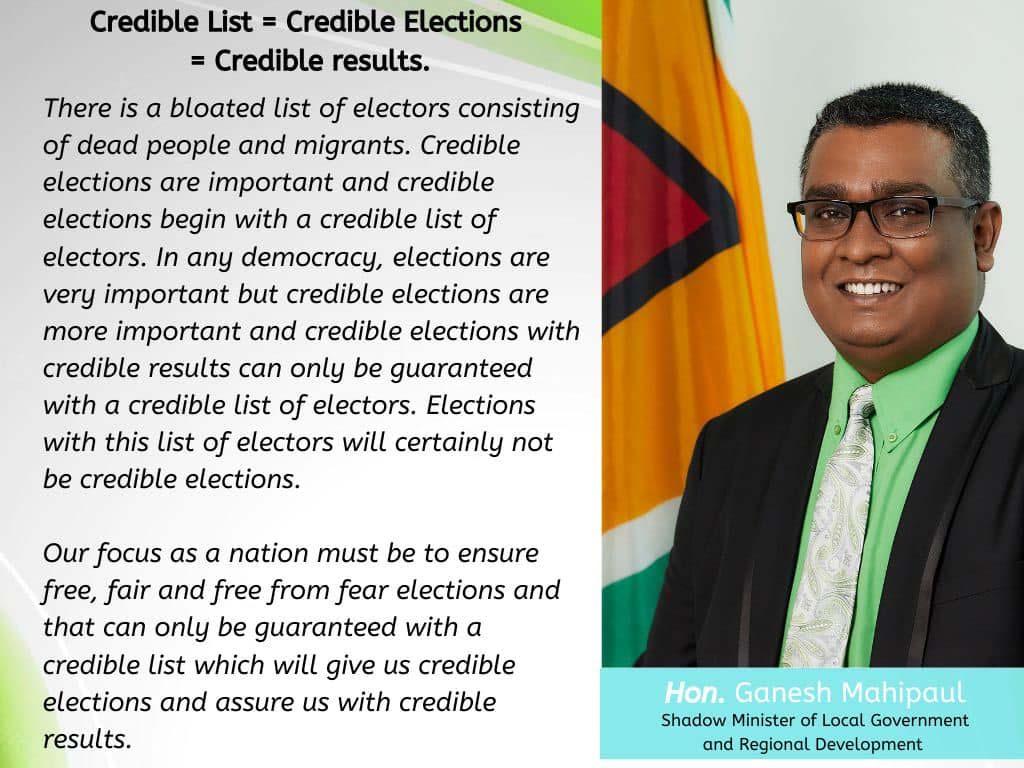
PAGE 8 NEW NATION NOVEMBER 2022
Ms. Genevieve Allen say a prayer at the start of the launch of the NCW 16 Days of Activism campaign against Gender-Based violence on Friday 25th November at its headquarters at Public Road, Kitty.
A section of the gathering at the launch of the NCW 16 Days of Activism campaign against Gender-Based violence on Friday 25th November at its headquarters at Public Road, Kitty.
National Chairperson of NCW, Mrs. Volda Lawrence, MP holds up the Pledge as herself and other members pose for a photo-op at the launch of the NCW 16 Days of Activism campaign against Gender-Based violence.
NCW16 Days of Activism campaign.
Lest we forget... Under the APNU+AFC Government
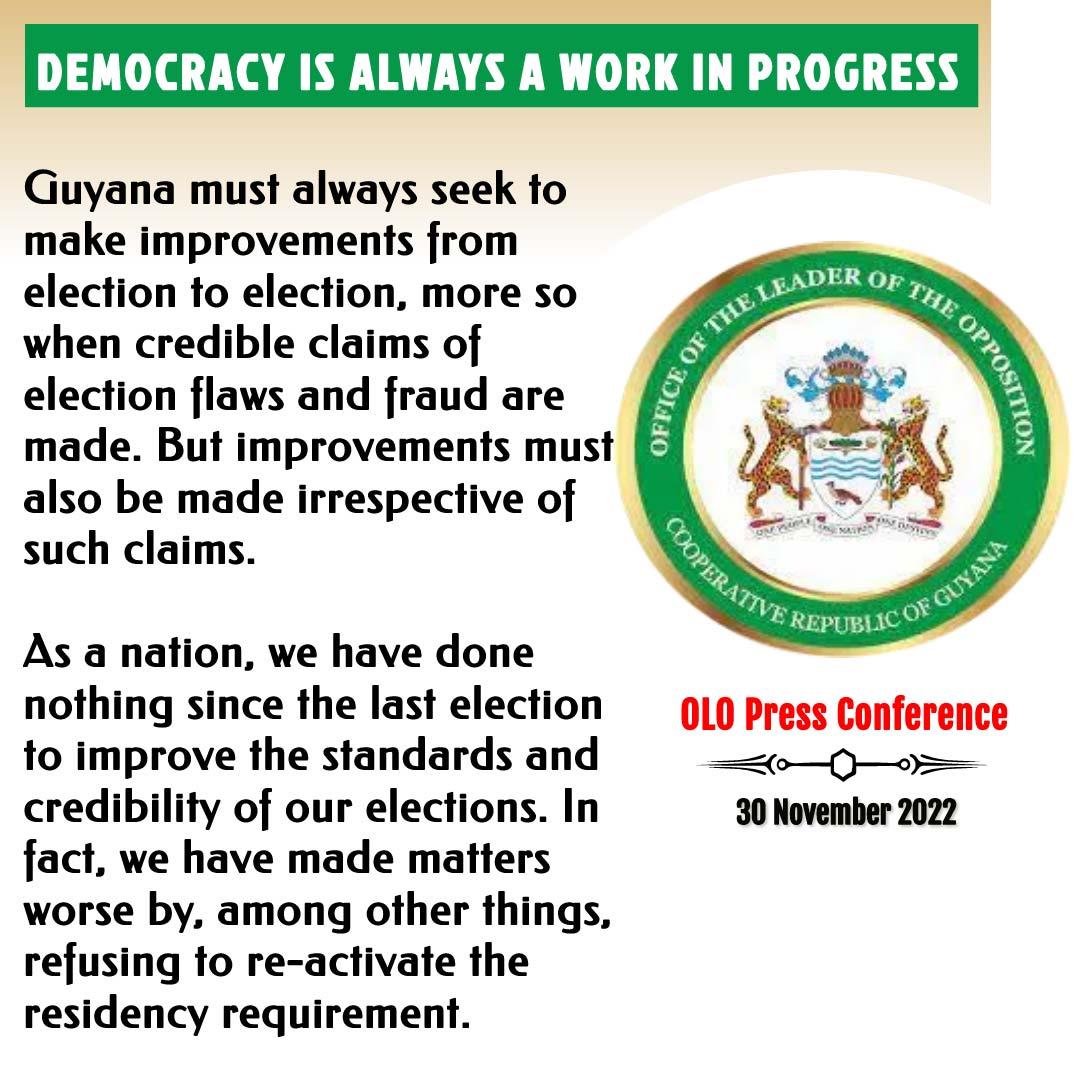
In November 2019, President David Granger announced that, in addition to TAX-FREE RETROACTIVE PAY INCREASES for Public servants (including teachers, nurses, doctors, members of the Defence Force, Police Force and the security services), the Coalition Cabinet approved the following LARGE INCREASES IN ALLOWANCES.
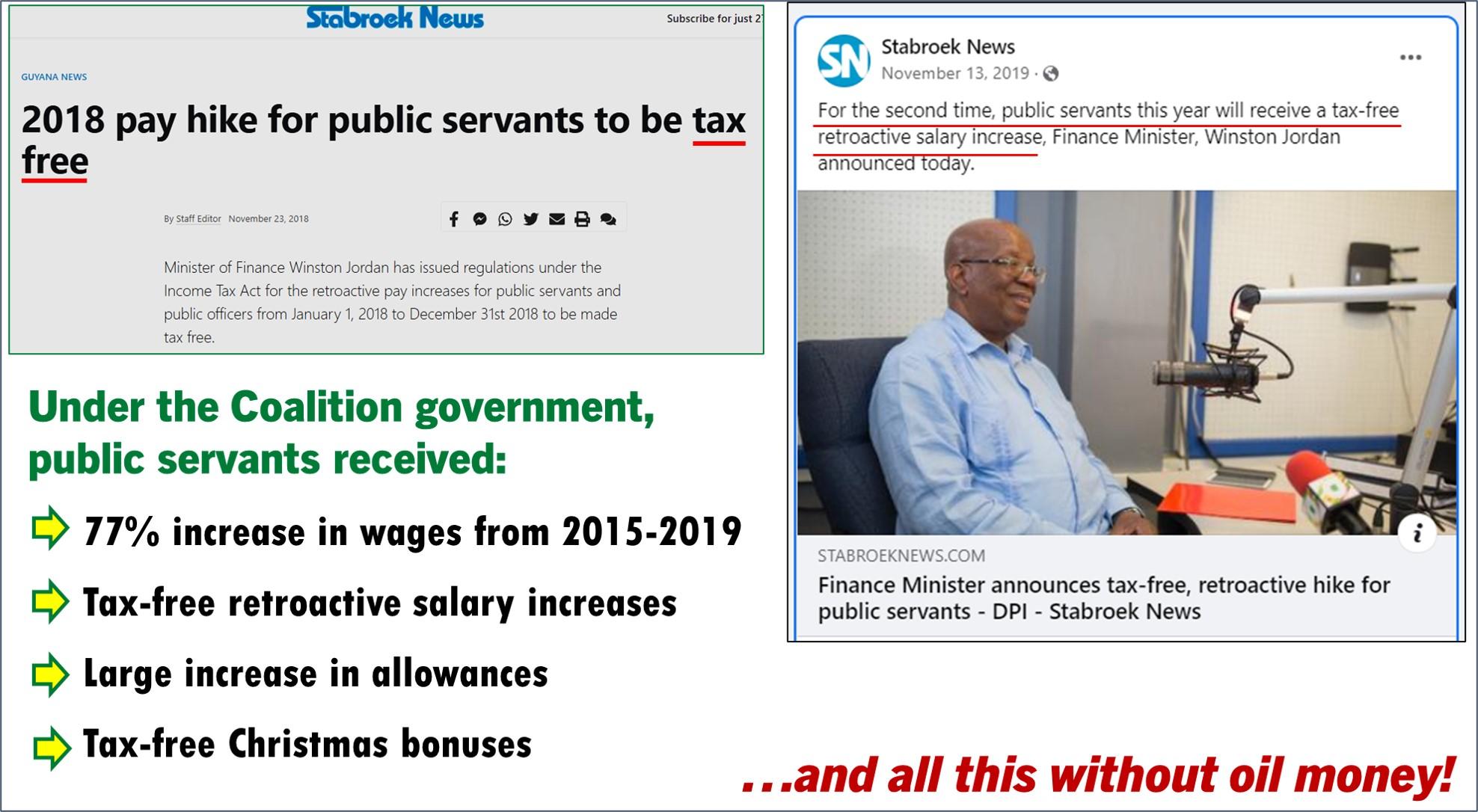
1. Station Allowances - increased by over 260% from $2,800 to $10,000;
2. Hinterland allowances - increased by between 100% and 600% from between $4000 and $12,000 to $24,000;
3. Risk allowance - increased by 900% from $500 to $5000;
4. Clothing allowance for teachers - increased from $13,000 and $22,135 to $15,000 and $30,000; and
5. Increased on-call allowance for doctors.
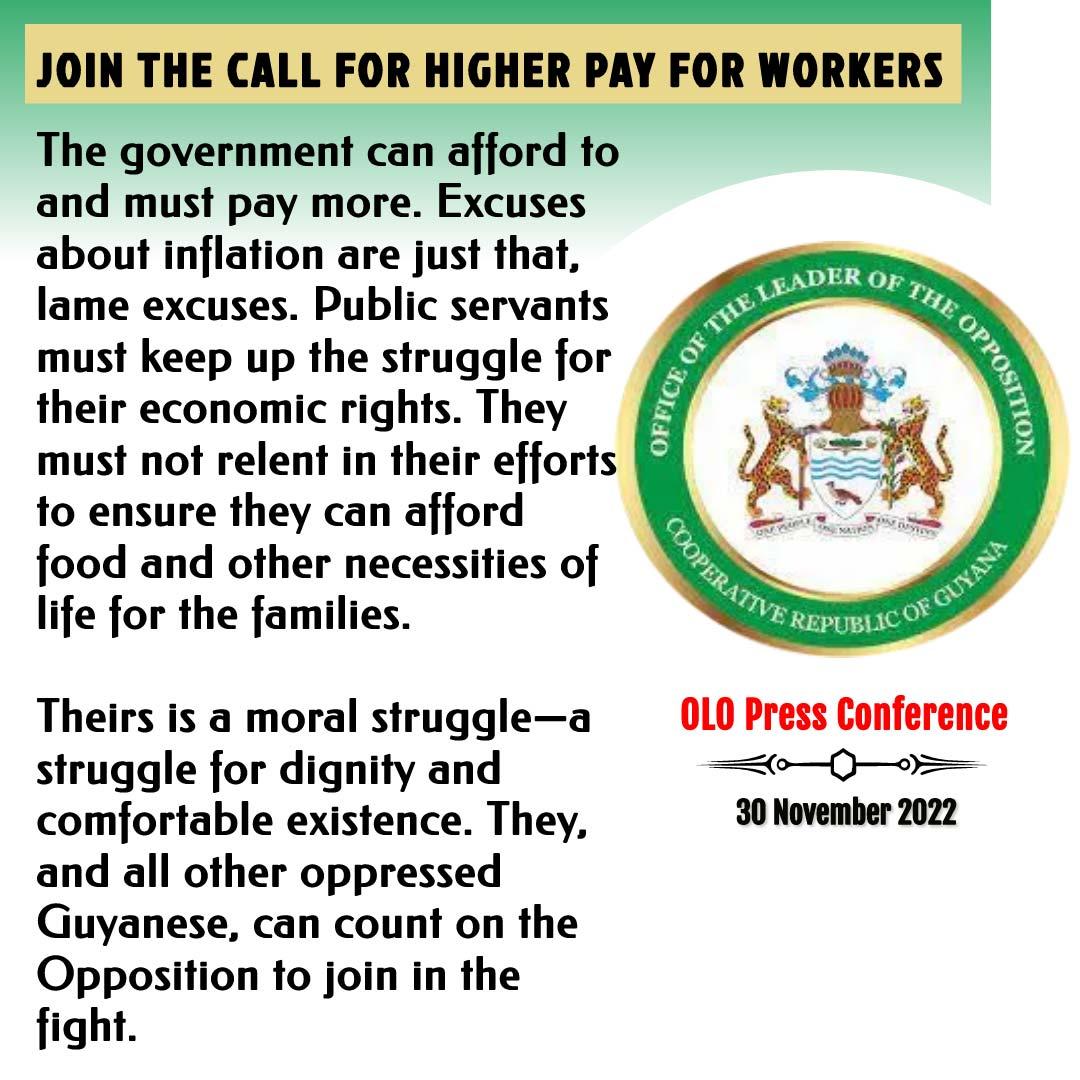
NEW NATION NOVEMBER 2022Page 9 POLITICAL
As the pandemic continues, many countries are rolling out COVID booster vaccines. In the UK, the autumn booster campaign is offering a fourth dose to those at higher risk from a COVID infection, including people with certain underlying medical conditions, and those aged over 50.
The autumn booster shots are bivalent vaccines, meaning they target the original strain of SARS-CoV-2 (the virus that causes COVID-19) alongside the omicron variant.
These vaccines are effective at topping up and broadening our immunity. But we expect that, as we’ve seen with the original COVID shots, the protection they provide, particularly against becoming infected, drops off in the months afterwards.
So we need to consider a vaccine strategy that will provide longer-term immunity. A new kid on the block – mucosal vaccines – could offer promise on this front. Mucosal vaccines are delivered in your nose or throat, as sniffable or inhalable formulations. They may sound new but actually we’ve been using them for years to vaccinate against diseases such as flu.
While conventional needle-in-your-arm vaccines induce a more systemic immune response, mucosal vaccines do something different. Viruses such as SARS-CoV-2 enter our systems via our nose and mouth when we breathe in small virus-containing droplets. This means immunity in our nose, mouth and throat really matters to stop infections.
Mucosal vaccines are designed to target this “mucosal immune system”. The mucosal immune system has the potential to stop the virus in its tracks when it enters the body, so scientists predict that mucosal vaccines could prevent infection.
Mucosal immunity may also be better at getting our immune system to remember SARS-CoV-2. Memory cells are specialised long-lived immune cells that remember the virus and carry instructions for our immune cells to be quickly deployed if it attacks again. Systemic vaccines are not so good at activating the memory cells in our nose and throat, but mucosal vaccines are.
Meanwhile, the fact that mucosal vaccines work locally could mean a smaller dose is needed. This, coupled with less stringent storage requirements compared with some conventional vaccines, may mean mucosal vaccines could be deployed more efficiently in resource-poor countries and be an important tool for vaccine equity.
Mucosal vaccines would probably also be a lot more appealing to those with needle phobias. Roughly 26% of the UK population admit to being afraid of needles, with the highest rates of phobia seen in youth, black and Asian groups – groups we know have lower vaccine uptake and more vaccine hesitancy.
The advantages are clear – but what does the evidence say?
Several mucosal vaccine candidates are being explored in pre-clinical and clinical trials. Results just published on a nasal booster vaccine in mice showed that robust mucosal immune responses were induced in the nasal and upper respiratory tracts.
Similarly encouraging results have been reported in macaque monkeys and hamsters. Several trials are underway to see if these results can be replicated in humans.
Iran, Russia, India and China have already introduced mucosal vaccines despite published data on their candidate vaccines remaining sparse. But some data has been publicly released.
Results from phase II human trials of an inhalable vaccine, now being rolled out in China, were released as a preprint (a study yet to be peer-reviewed). While the study didn’t assess mucosal responses, it did show that systemic antibody levels were higher and remained higher over the six months assessed compared with a conventional booster.
But the picture is mixed. A phase I trial of a nasal formulation of the Oxford AstraZeneca vaccine showed little to no induction of mucosal immunity and weaker systemic antibody responses compared with a conventional vaccine.
The reasons for these disparities are not clear, but they could include the method of delivery. The administration of mucosal vaccines requires precise engineering and aerosol science to ensure the small
World Diabetes Day Message
By Dr. Karen Cummings, APNU+AFC Shadow Minister of Health
Fellow Guyanese. Monday November 14, 2022, is World Diabetes Day. It was in 1991 that it was determined that global attention needed to be focused on this condition and it declared an official United Nations Day in 2006.
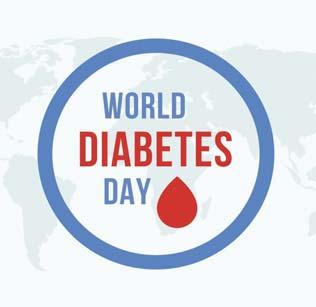
World Diabetes Day is intended to raise awareness about this global public health concern. According to the Pan American Health Organization (PAHO) and the World Health Organization (WHO), deaths from Diabetes Mellitus have increased by an alarming 70 percent globally between 2000 and 2019. It accounted for an eighty percent rise in male deaths among the top ten causes of death.
This chronic disease is responsible for the loss of highest number of years of healthy life and has been associated with a high treatment cost. PAHO/WHO further notes
that while there are 62 million people living with diabetes in the Americas, sadly there continues to be the untimely diagnosis of this non-communicable disease, and clients usually encounter much difficulty in effectively and efficiently controlling and managing the chronic disease.
The profound theme for this year is captioned, "Access to Diabetes Education - Access to Care." It is necessary to have social participation, and the support and commitment from the
Government and civil society to promote and prevent the complications of this scourge. Primary health care doctors must be provided with the necessary tools to make early assessments and to help patients to detect early symptoms to avoid frequent amputations.
Diabetic Patients must be aware of the common symptoms of excessive thirst, increased appetite, frequent urination, and loss of pounds (weight loss) and spring in action.
It is firmly established that our people can delay type two diabetes, the most common form of diabetes, by lowering their risk by engaging in regular physically activity, by healthy eating, by maintaining a healthy body weight, and by avoiding tobacco use. We must undertake our annual eye examination and let our primary care physician examine the optic fundus. These actions can go a long way in helping to prevent vision loss.
Let us all join hands to educate the nation on diabetes mellitus to protect and prevent 500 million persons becoming diabetic by 2030.
Signs of High Blood Sugar
High blood sugar levels (or hyperglycemia) are a symptom of diabetes mellitus. They are also a precursor to this disease, which can be life-limiting. When you ingest sugar or any food high on the Glycemic Index (GI), your blood sugar levels quickly increase. They peak within 45 minutes of eating. In a normal person, the blood sugar then begins to decrease. Within 2 hours, it’s back to normal levels. When you eat foods that are low on the GI, your blood sugar rises and stays level for an extended time before declining again.
In a diabetic person, the blood sugar levels cannot be managed by the body and do not lower. These constant high blood sugar levels place an enormous strain on the organs and cells of the body. After a prolonged period of not addressing high blood sugar levels, permanent damage is possible. That is why most diabetics have to use insulin. Our bodies produce insulin in the pancreas. A normal body produces enough insulin to control blood sugar levels. A diabetic’s pancreas
cannot produce enough insulin. So, people with diabetes must supplement the insulin supply in their bodies.
Another way to manage and minimize blood sugar levels is to eat foods that are low on the glycemic index. That way the body’s blood sugar levels are not on a rollercoaster ride of ups and downs. Therefore, most diabetics have to be careful about what they eat and drink. They avoid sugary drinks and foods rich in bad carbohydrates.
Studies suggest that many people have high blood sugar levels but aren’t even aware of it. They are a ticking time bomb because their bodies are becoming more and more damaged. If they aren’t aware of their condition, they won’t change their eating habits and seek help. If you display some of these symptoms, you may have high blood sugar levels. A simple blood test can determine this. It may not yet be diabetes, and dietary changes and exercise will be treatment enough.
droplets containing the vaccine are easily inhaled.
20 signs of high blood sugar
1. Fatigue.
2. Blurred vision.
3. Headaches.
4. More frequent trips to the bathroom.
5. Insatiable thirst.
6. Increased appetite.
7. Your mouth feels dry all the time 8. You may feel short of breadth. 9. You may find it difficult to concentrate and remeber things.
10. You may have abdominal paind and gastrointestinal issues.
11. Slow healing of cuts and wounds.
12. You may have recurrent infections.
13. Your skin may be drier than usual and itchy.
14. You may experience numbness or pain in your extremities.
15. You may experience impotence or infertility.
16. Fruity-smelling breath. 17. High fever. 18. Stroke.
19. Heart disease.
20. High blood pressure.
Several strategies have been used to deliver mucosal vaccines including nebulisers (a machine that turns liquids into a fine mist that can be inhaled), nasal sprays and inhalable devices like the inhalers asthmatics commonly use.
The particle size, formulation (the ingredients and how they’re combined), as well as the vaccine’s ability to stick to and enter our cells will all affect how effectively the vaccine particles are taken up in the body. This is called the vaccine’s “bioavailablity”. We still have a lot to learn about which delivery strategy is optimal for which vaccine.
So where does this leave us?
This pandemic is still very much ongoing. And we’re learning more all the time about the long-term implications of COVID infections on our health, including heart complications and long COVID.
This, coupled with the emergence of ever-more persistent variants, mean it’s important to keep protecting ourselves and our loved ones from the worst effects of the disease. Vaccines are some of the best weapons we have.
It will be important to watch and learn from the mucosal vaccine rollout in other countries and scrutinise their data when it’s released.
Meanwhile, given the urgent need for long-term vaccines, it would seem prudent to invest in strategies, not just for the development but also the manufacture of such vaccines. They could be an invaluable tool in this pandemic, but also against many other infections, including those we have yet to encounter.
PAGE 10 NEW NATION NOVEMBER 2022
COVID: inhalable and nasal vaccines could offer more durable protection than regular shots
HEALTH
Community consultations
Regional Chairman, Mr. Deron Adams led a team of Councilors of the Regional Democratic Council of Region #10 on a series of interactive consultation visit to communities all along the Berbice River. When the team visited the Amerindian community of WikkiCalcuni, the team held conversations with residents, students teachers, health care personnel and other interest groups to continue their push to ensure that the Council's actions are guided by first hand knowledge of the issues affecting these communities.
The RDC will continue to meet with and seek guidance from residents in communities across the geographical expanse of Region #10, fulfilling its mandate to represent the interests and needs of residents, as development plans are crafted for and on their behalf.
Chairman of the Education Committee
Benjamin, Welfare Committee
Chairman Coretta Braithwaite-Walton, Health Committee Chairman Norris King and Councilor with responsibility for the Community Rosamund Samuels accompanied the Regional Chairman on this visit to communities in sub region #2.
The Regional Chairman and the Councilors of the RDC have made it their resolve to actively listen and act upon their interactions with residents all across the 6,555 square miles of Region #10.
The recent visit to sub-region #2 communities along the Berbice river was an active demonstration of their commitment, as views were shared, concerns raised and issues addressed collaboratively to arrive at recommended resolutions, and the residents of these communities once again were able to connect with their elected representatives.

REOs accused of instructing public servants to work overtime without pay
Shadow Minister of Local Government and Regional Development, Mr. Ganesh Mahipaul, is accusing the Regional Executive Officers (REOs) in all ten (10) administrative regions of compelling workers in the various regions to work beyond stipulated hours without compensation.

In a statement, Mahipaul said it was brought to his attention these REOs are instructing public servants to work on Saturdays and Sundays after completing their full Monday to Friday working hours.
According to him, the majority of the public servants are instructed to show up at work sites and do work outside of their job descriptions without compensation.
“Politically appointed REOs must stop violating the rights of public servants and respect the Public Service Rules.”
Apparently, the issue is widespread. Specifically, said the shadow minister, REOs are threatening the regional public servants by saying the President requires their presence on Saturdays and Sundays.
Workers are being asked to “other things, clean-up activities in their respective regions, attend and perform clerical duties at various activities like the Men on Mission (MOM) hoax and to make up numbers for whatever activity the President or his Ministers may have in the various regions,” stated the Member of Parliament (MP).
REOs, permanent secretaries and heads of department of the various government departments attention was drawn to section F (Official Working
Hours and Conduct) of the Public Service Rules and Government Circular No. 14/1986 dated 1986-05-28.
It was reminded working hours are Monday to Thursday – 8.00 a.m. -12.00 noon and 1.00 p.m. – 4.30 p.m, and on Friday – 8.00 a.m. -12.00 noon and 1.00 p.m.– 3.30 p.m., and these rules exist the MP is calling for an immediate end to the abuse of workers.
“Public servants are already suffering at the hands of the PPP/C Government and this was advanced with the most recent shameless announcement of an 8% salary increase. Leave the public servants with their Saturdays and Sundays unless they offer their services voluntarily.”
(Village Voice News)
Opposition Member of Parliament Volda Lawrence believes that the country’s public servants will not see any improvements in their standard of living with the recently announced 8% across the board increase by the government.

In fact, Ms. Lawrence is predicting that after the lump sum payment to public servants in December, the cost of living complaints will be high on the agenda again.
During an appearance on her Party’s Nation Watch TV programme, she said the government did not take the need of public servants into consideration when it imposed the 8% salary increase.

“At the end of this month, at the end of December, then people are going to be questioning, what did we really receive, because Guyanese people can now make a choice as whether the APNU+AFC government had their best interest at heart as oppose to the PPP government because we didn’t only give increases to bridge the gaps left by the PPP after their 23 years in office,” Lawarence said.
The increase, she said should have reflected the reality on the ground after careful consideration with the unions representing the workers.
“So the prices are going to balloon, you are giving this increase at the time of Christmas when everybody is going out
there and shop, so basically at the end of December, people are going to start questioning, did I really get an increase, what is it I got? Because, where is it,” Lawarence questions.
According to the Opposition Member of Parliament, the poverty rate is way too high in Guyana for the government to just impose its will on the people without having a careful analysis of their needs.
“So its time for them to start considering measures that will affect people across the board in a positive way, you give an increase and it sounds good but when I as a head of a household get out into the market, get into he supermarket, then its another ball game, ” Lawrence said.
The Government has come in for some criticism over the 8% retroactive salary increase, with many public servants complaining that the rise in the cost of living is impacting their lives and spending and 8% will not fix that.
(News Source)
NEW NATION NOVEMBER 2022Page 11
REGIONAL UPDATES
Carol
8% salary increase will have no impact on cost of living woes for public servants - Volda Lawrence, MP
The Regional Chairman and Councillors on their recent visit along the Berbice River.
Eighty-three year old Berbice River resident relating his difficulty accessing his pension and non-payment of senior citizens' cash grant for 2022.
Mr. Ganesh Mahipaul, MP
No invitation from Government to Opposition to sit on State Boards
There have been countless utterances from President Irfaan Ali about One Guyana and inclusive governance. What Guyanese have seen instead is ample evidence to the contrary, that is, evidence of discrimination, cronyism, and divisiveness.
As regards the representation of the Opposition on State Boards, the current Leader of the Opposition has received no request from the government for an opposition representative, though several boards were recently appointed. This breach extends to boards on which the Opposition is a statutory member, such as the Guyana National Broadcasting Authority.
Were the PPP government genuine about inclusion, one would have expected that it would have followed the practice of inviting the Opposition to be represented on a wide range of state boards, authorities, and commissions –whether or not the relevant statutes so dictated. It has completely ignored to do so. Instead, it has sneakily appointed and reappointed boards in several sectors.
Clearly, the government does not like scrutiny and has a likeness for corruption. The non-appointment of opposi-

tion members to state boards is one sure way of ensuring the government corruption can continue to flourish without scrutiny. As it protects the likes of Jagdeo who has been fingered in allegations of bribery and corruption the government cannot afford scrutiny.
Let us recall that opposition representation on boards is a practice that was birthed through several high-level bilateral talks between the major parties. All parties had then agreed that the presence of the Opposition on State Boards promotes inclusivity and transparency in government. Evidently, the present PPP regime prefers to practice the politics of exclusion.
We should point out that unlike the PPP, which boycotted all state boards after its electoral defeat in 2015, the APNU+AFC Coalition has announced or indicated no such position or intention.
The government must recognise that it has an obligation to ensure the opposition is represented on state boards and should act to rectify this problem. The government needs to inform the people of Guyana whether it intends to honour its obligation and ensure the participation (statutory and non-statutory) of the Opposition on the boards of all sectors.
Leader of the Opposition and Team met with Members of the Local and Diaspora Clergy
On Wednesday 16th November 2022, Leader of the Opposition, Mr. Aubrey C. Norton, MP, and team met with over 30 members of the local and diaspora clergy.
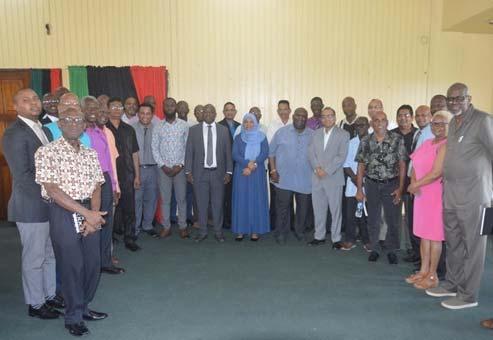
During the meeting, the Leader highlighted the value of dialogue with all stakeholders to help reduce tensions and to foster unity, and to also explore ways that will develop the country.
The scripture verse which was used to underpin these ideas was Micah 6:8, “He hath shewed thee, O man, what is good; and what doth the Lord require of thee, but to do justly, and to love mercy, and to walk humbly with thy God”. It was empha-
sized that those leading should always be just, merciful, and humble.
The Leader and team expressed their gratitude for the engagement and assured the visitors that they will continue to embrace the biblical principle in Micah as they continue to fight against discrimination and injustice in the nation.
The discussion was fruitful and further consultations will be held with the church and other religious bodies on an ongoing basis.
The Leader was accompanied by Volda A. Lawrence, MP, Vinceroy Jordan, MP, Natasha Singh- Lewis, MP, Mervyn Williams, Kibwe Copeland, and Aubrey Retemyer.
Obituaries
Winston Shripal Murray, CCH, MP, Economist, Attorney at Law, Former Deputy Prime Minister and Minister of Trade, Tourism and Industry and Chairman of the People's National Congress Reform, died on November 22nd, aged 69.
Mr. Murray was born on the 31st January 1941 on the Essequibo Island of Leguan where he grew up.
He was a respected and valued member of the PNC/PNCR for more than thirty (30) years and served the Party in many capacities, including that of Chairman.
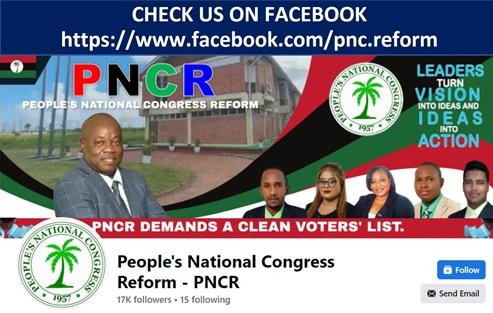
Winston Murray had been a Member of Parliament for the PNC/PNCR since 1985 and served as Chairman of the Public Accounts Committee until May 2006. He was the Shadow Minister of Finance and Economic Development and acknowledged as a most outstanding Debater in the National Assembly of the Parliament of Guyana.
He was a trained teacher who after a career in teaching, later moved to the United Kingdom and attended the London School of Economics (LSE) and Political Science where he obtained the BSc. (Hons) in Economics, specialising in Analytical and Descriptive Economics. Mr. Murray obtained a Certificate in Public Finance from the IMF. He later attended the University of Guyana where he obtained the LLB degree and attended the Hugh Wooding Law School where he obtained the Legal Education Certificate. He has since been in private legal practice.
Mr. Murray served the Government of Guyana in many capacities including that of: Permanent Secretary in the Ministry of Trade and Consumer Protection (1983-84); in the Guyana Embassy in Brussels; Head of the Department of International Economic Cooperation; and Head of the Presidential Secretariat (1985). Mr. Murray was a senior Minister and Deputy Prime Minister from 1985-1992. May his soul continue to rest in eternal peace!

PAGE 12 NEW NATION NOVEMBER 2022
NEWNATION
Mr. Winston S. Murray, CCH
Remembering Winston Shripal Murray, CCH People’s National Congress Reform, Congress Place, Sophia, Georgetown. Tel: (592) 225-7852

















































